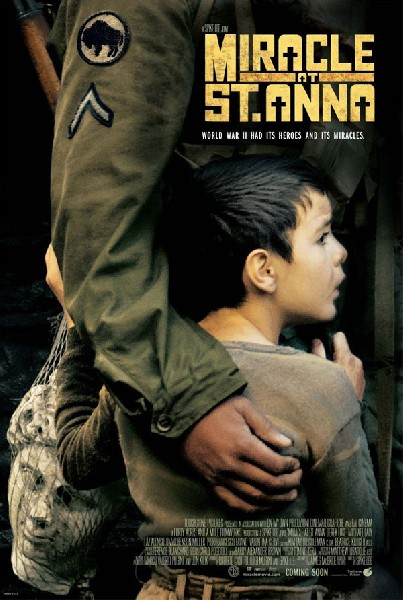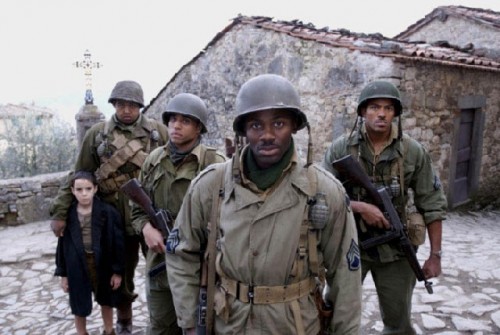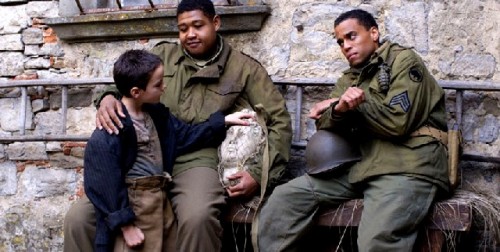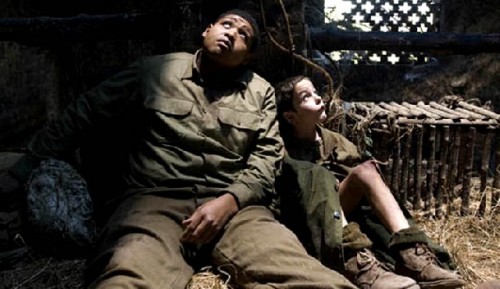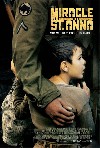Miracle at St. Anna
Spiking WWII
By: Charles Giuliano - Oct 01, 2008
Miracle at St. Anna
Written by James McBride based on his novel of the same name. Directed by Spike Lee; Cinematography Matthew Libatique; Music by Terrence Blanchard; Editing by Barry Alexander Brown. Cast: Derek Luke (Staff Sergeant Aubrey Stamps), Michael Ealy (Sergeant Bishop Cummings), Laz Alonzo (Corporal Hector Negron), Omar Benson Miller (Private First Class Samuel 'Sam' Train), Francesco Favino (Peppi 'The Great Butterfly' Grotta), Valentina Cervi (Renata), Matteo Sciabordi (Angelo Torancelli), Walton Goggins (Captain Nokes).
As men of the 92nd Infantry Division are positioned along a river bank preparing to cross and attack the German infantry a sound truck pulls up. The voice of a seductive female propagandist wafts through the air. She is the Nazi version of the infamous Tokyo Rose. In smarmy but realistic terms she urges the black soldiers to consider fighting and dying for a country that treats them as second class citizens.
After a furious engagement most of the men are wounded and dying in the river running red with their blood. On a radio a handful of men who have managed to cross to the other side frantically call in an artillery barrage on the enemy position. In a gross example of racism Captain Nokes ( Walton Goggins who plays Shane on "The Shield) refuses to believe that the men have indeed crossed. When a black officer of lesser rank pleads with Nokes he is rebuked with a slur.
It didn't take long for Spike Lee to get to the theme of racism that has dominated his distinguished but contentious career. In this war film, set in Italy during WWII, however briefly, one hoped that Spike would take a break. The sad truth is that he almost made it this time. This is a film that has compelling and intense moments that come close to adding up to a remarkable film.
The action opens in an unexpected manner. We see a postal clerk selling stamps. He is the very essence of the beaten down, bureaucratic lifer. But the man at the window evokes a sudden rage. In a moment of recognition he fires point blank with a vintage German Luger. Why? Well the rest of the film back tracks to explain this moment of recognition and murder.
The story line is loosely based on actual events during the Italian campaign. In August 1944 there was a massacre of Italians in the village of Sant'Anna di Stazzema by the Waffen-SS. It was allegedly provoked by reprisals for protecting a group of Partisans who are led by Peppi "The Butterfly" Grotta (Pierfrancesco Favino). The fictionalized account has them betrayed by one of their own. This plot twist led to protests against the film among survivors of the Partisans.
There are four soldiers who, through luck and courage, have managed to survive. One of them, an enormous man totes along a head he found in Florence alleged to be an ancient fragment from the damaged Ponte Santa Trinita. For the gentle giant Private Train (warmly played by Omar Benson Miller) it is less a souvenir and war prize than a good luck charm and mojo. In moment of stress he rubs it and, well, Miracles happen.
Taking cover in a barn during relentless shelling Train stumbles upon a boy, Angelo (Matteo Sciabordi), who is pinned down under heavy fallen timbers. With enormous exertion he frees the boy. Soon they are bonded. Their touching relationship of need and trust becomes the major theme of the film.
As they make their way to a village the three other soldiers see things differently. After initial fear and conflict they are accepted and fed by the local people. One of the men speaks some Italian and as it turns out a woman in the village, Renata (Valentina Cervi), happens to speak English. How convenient especially in a remote mountain village. She is also, you guessed it, a babe. Particularly when compared to all those simple peasant women. This reminded me all too sadly of "Dances with Wolves" when the Indian who spoke English proved to be a gorgeous, captured white woman. Hey, only in the movies.
Two of the men compete for her attention. One respects her while the otherseduces her. He has the men serve as vehicles for his agit prop views of how they are respected by these Italians. In contrast to the racism back home. All true but the dialogue seemed to belong to the post Civil Rights movement and not 1944 Italy.
There are lots of twists and turns as Lee tries to craft a film from his take on the role of black troops during WWII. Apparently he got into a beef with Clint Eastwood because there were no black actors in his Iwo Jima epics. This film, Lee's first war film, is an attempt to set the record straight. Well, kindah. If Lee had focused on that theme this may have been a credible film. The battle scenes and the highly realistic massacre of the villagers have been widely praised. He is a master of the craft when he can put his ideological hang-ups aside long enough to just make the damn movie.
Eventually the 92nd Infantry arrives. Captain Knowles wants to court marshal the four soldiers for not managing to hold onto a German prisoner as ordered. The captive was slaughtered by that turn coat partisan. Who managed to slip away in the confusion that follows when the Germans arrive and just about everyone is killed. Train is killed but Angelo survived. The trophy sculptured head is passed along to Hector (Laz Alonso) who ends up as the postal clerk. In a recognition of courage and honor a German officer has presented the wounded Hector with a Luger to "defend himself." Yes, folks, That Luger.
How a postal worker manages to take a Luger to work for some 20 odd years is beyond me. Or that a Judas Partisan just happens to turn up at his window. But the ending is even more improbable. During the ensuing trial bail is posted by a stranger. Some $2 million. Through mysterious circumstances Hector has escaped to the Bahamas. There on a beach, good grief, his benefactor is, my goodness, a now grown up tycoon who is none other than little Angelo.
The sad point is that this might have been a fine film. The magnificent score by Terence Blanchard may well be nominated for awards. And Omar Benson Miller deserves recognition for best supporting actor. He was just wonderful and heart warning as Angelo's protector and "Chocolate Giant." While there are compelling moments, this is not a successful film.
While Spike Lee sees himself as Doing the Right Thing, too often he evokes a quick knee jerk response through cartooning and profiling. In that sense, his characters lack depth and dimension. Ultimately we don't believe in or care for what we are presented. Lee, as an artist, is at risk of becoming an artifiact of an era that is passing. The times they are a changing and it is up to all of us to keep pace or fall behind.

